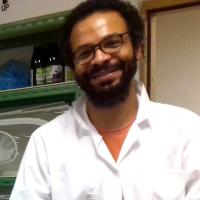
Agroecology Reading time 3 min
Nicolas Rode, researcher in evolutionary genetics
Published on 23 June 2020
Studying the evolution of insects
Nicolas Rode was recruited by competitive examination in 2019 as a research scientist by INRAE’s Plant Health and Environment division. He joined the Institute’s Centre for Biology and Population Management (CBGP) in Montpellier. The Centre carries out research in genetics, ecology and classifying insect species of agricultural interest and mammals that transmit disease to humans.
Rode investigates how one insect pest, Drosophila suzukii, infests different fruit (cherry, strawberry, raspberry, grape, etc). He is trying to understand if the use of different host plants by this species is associated with a process of ecological specialization and genetic changes within populations. To do so, he uses different evolutionary genetic approaches in the lab and in the field. In the long term, his work will lead to a reduction in the use of pesticides and alternative biocontrol strategies to keep pests at bay.
The young researcher is also an international expert on the risks associated with new pest management strategies based on releasing genetically-modified insects. His work helps provide a supervisory framework for the technology by regulating it at European and global level.
Research requires creativity and rigour
After earning his doctoral degree, Rode became interested in studying the genetics of natural populations. After a first post-doctoral fellowship in genetics at the University of Ottawa, he followed on with a second at the Genetic Improvement and Adaptation of Mediterranean and Tropical Plants research unit in Montpellier. This led to a third fellowship at the Centre for Biology and Population Management in Montpellier.
Rode enjoys combining fundamental and targeted research and the contact with people from different backgrounds that this affords. He also appreciates the balance between creativity and rigour that research requires. The creativity part allows him to look at existing scientific questions from a new angle or ask novel questions. The rigour part lets him test working hypotheses so that his results can be reproduced in different laboratories. Striking a balance between the two is the key to innovative research!
Mini CVSince 2019 Research scientist, INRAE, Centre for Biology and Population Management, Montpellier, France. |
